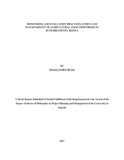| dc.description.abstract | Many Kenyans still live below poverty line in rural areas and derive their livelihood directly from agriculture. Agriculture plays a dual role in efforts to eradicate hunger through enhancing food production and serving as a source of employment. providing families with a source of livelihood. and raw materials that stimulates the formation of industries. Agriculture is the world's single largest employer and can improve the income of the marginalized in tandem with the theory of change that advocates transformation through interventions. The revitalization of this sector is therefore critical. Monitoring and Evaluation are integral tools in managing and accessing efficiency and effectiveness in this sector. In the recent times, sponsors and development partners have increasingly focused on the impact derived from implementations of projects. The objective of this study was to assess the influence of Monitoring and Evaluation practices namely Monitoring and Evaluation planning, Monitoring and Evaluation capacity building, Monitoring and Evaluation data demand and use and surveillance & research in Monitoring and Evaluation and the practices combined and their influence on Agricultural food projects sustainability as well as the moderating influence of ethics in Monitoring and Evaluation. The research was conducted in Nyeri South Sub-County, Kenya, and adopted a descriptive survey design and correlation research design. The target population included the Sub-County agricultural officer, four other Sub-County officers, four extension officers and 211 farmers engaged in the agriculture food crops projects a total of 220 respondents. Stratified random sampling was used to get a sample population that represented the sub county and simple random sampling was used to identify respondents from the various groups while a census/saturated sampling was used for the five agricultural officers and four extension officers. Yamane‘s formula was used to determine the sample size from among the farmers‘ groups. The test-retest was used to calculate Content Validity Ration and the average CVI was 0.931 and reliability using the co-efficient alpha was 0.84.Questionnaires, observation and interviews were used to collect the data. The collected data was analysed using both descriptive and inferential statistics especially Pearson correlation tests. Multiple Linear regression was used for hypotheses testing. Statistical Package for Social Sciences (SPSS) software was used as a tool in the analysis of data. Based on the study findings, the study established a positive and significant influence of Monitoring and Evaluation planning and coordination (β1=0.223, ρ<0.05), capacity building (β2=0.170, ρ<0.05), data demand and use(β3=0.155, ρ<0.05) and research &surveillance in Monitoring & Evaluation (β4=0.282, ρ<0.05) on the sustainability of Agricultural food crop projects. Combined Monitoring and Evaluation practices did not influence sustainability of Agricultural food crop projects (β5=0.103, ρ>0.05). In addition, findings also showed that ethics moderates the relationship between Monitoring & Evaluation planning and coordination (β6i=0.139, ρ<0.05) and data demand &use (β6iii=0.085, ρ<0.05),but does not moderate capacity building (β6ii=0.287, ρ>0.05)research& surveillance in Monitoring & Evaluation (β6iv=0.150, ρ>0.05) and the sustainability of Agricultural food crop projects. Therefore, the study concluded that with more planning and coordination, capacity building, data demand and use and research and surveillance as well as incorporation of ethics in Monitoring and Evaluation with due reference to efficiency and effectiveness sustainability of Agricultural food crop projects will be enhanced. Further there is need for proper planning and coordination regarding seedling distribution and planting, targets setting and indicator formulation and collaborative efforts regarding data demand and use and capacity building. There is need for increased investment in Research and Development as well as surveillance to enhance Monitoring and Evaluation work and projects sustainability. | en_US |



